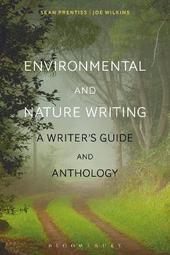
|
Environmental and Nature Writing: A Writer's Guide and Anthology
Paperback / softback
Main Details
Description
Offering guidance on writing poetry, nonfiction, and fiction, Environmental and Nature Writing is a complete introduction to the art and craft of writing about the environment in a wide range of genres. With discussion questions and writing prompts throughout, Environmental and Nature Writing: A Writers' Guide and Anthology covers such topics as: * The history of writing about the environment * Image, description and metaphor * Environmental journalism, poetry, and fiction * Researching, revising and publishing * Styles of nature writing, from discovery to memoir to polemic The book also includes an anthology, offering inspiring examples of nature writing in all of the genres covered by the book, including work by: John Daniel, Camille T. Dungy, David Gessner, Jennifer Lunden, Erik Reece, David Treuer, Bonnie Jo Campbell, Alyson Hagy, Bonnie Nadzam, Lydia Peelle, Benjamin Percy, Gabrielle Calvocoressi, Nikky Finney, Juan Felipe Herrera, Major Jackson, Aimee Nezhukumatathil, G.E. Patterson, Natasha Trethewey, and many more.
Author Biography
Sean Prentiss is Associate Professor of English at Norwich University, USA. He is author of Finding Abbey: The Search for Edward Abbey and His Hidden Desert Grave (2015), which won the National Outdoor Book Award for Biography/History. He is also co-editor of The Far Edges of the Fourth Genre (2014). Joe Wilkins is Associate Professor of English at Linfield College, USA. His memoir, The Mountain and the Fathers: Growing Up on the Big Dry (2013) won the GLCA New Writers Award for non-fiction and his work has appeared in Georgia Review, Harvard Review and Slate among many other periodicals.
ReviewsThis book presents an introductory history of nature writing-covering subcategories ranging from pastoral and adventure writing to postcolonial and climate change narratives-and serves as a comprehensive guide to the elements of its craft in essays, stories, and poems. Both veterans and newcomers to environmental and nature writing will find inspiration in the exercises and anthology sections, which include work by Camille T. Dungy, Juan Felipe Herrera, Benjamin Percy, and many others. * Poets & Writers * The planet is in a real crisis - and one good effect is that it seems to be producing ever more wonderful writers about nature and the environment, almost as a human produces antibodies to ward off disease. Here you will find introductions to many of them--and an invitation to join their ranks. * Bill McKibben, editor of American Earth: Nature Writing Since Thoreau * Sean Prentiss and Joe Wilkins' new craft text and anthology, Nature and Environmental Writing, is a writing manual full of provocative prompts and a respectful and informative literary history of the genre we have previously kept in a small box marked "nature writing." It also includes a discerning multi-genre reader. The book challenges writers to factor into their writing the imprint of place and landscape on the human story. Whether writers adopt this textbook for a classroom setting or embark upon its lessons and inspirations in a self-study, they will surely come away with new and wild ideas about the subtle influences that science, the natural world, and the environmental imagination exert on all of our experiences, memories, and stories. * Debra Marquart, Professor of English at Iowa State University and author of The Horizontal World * This is lucid, interesting and highly readable. * Hywel Dix, Bournemouth University, UK * The sense of historical development coupled with the sensitivity to the changing social and cultural landscapes makes this book useful to a number of audiences and promises to invite even more nature writers to join those already on the trail ... Part II focuses on various writerly concerns such as tone, symbol, point of view, character (both people and place), persona, research, revision, and the like. Prentiss and Wilkins deal with these issues by creating chapters that offer related readings from the anthology, a free-write prompt, an illustrating vignette, a discussion of the issue at hand, and exercises. These are standard writing issues for nature writers, and I find Prentiss and Wilkins's treatment of them straightforward and refreshing ... Environmental and Nature Writing: A Writer's Guide and Anthology includes nonfiction, fiction, and poetry and provides a great range of writing from multiple perspectives covering multiple genres. I find the collection useful, as models for writers and as challenges to how we define nature and environmental writing. Prentiss and Wilkins have given us a useful trail to follow ... I will use Prentiss and Wilkins's book the next time I teach nature writing. * ISLE: Interdisciplinary Studies in Literature and Environment *
|